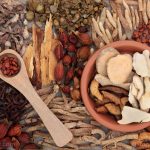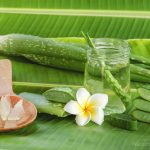
Beat cystic acne with these herbal treatments
Thursday, May 09, 2019 by Zoey Sky
http://www.naturalnewsherbs.com/2019-05-09-beat-cystic-acne-with-these-herbal-treatments.html

Acne can affect a person’s confidence, especially when you have a condition like cystic acne. The most severe type of acne, this condition causes large, painful cysts to appear on your face and on other parts of your body. To relieve the symptoms of cystic acne, try some natural remedies like aloe vera or green tea extract.
Cystic acne, a painful skin condition
Cystic acne occurs when cysts form underneath your skin. Cysts form due to a combination of bacteria, dead skin cells, and oil that get trapped in your pores.
Any person can develop acne, but cystic acne is more common in people with oily skin. The condition is also more common in teenagers, women, and older adults with hormonal imbalances.
In some cases, cystic acne can improve with age. But the stubborn and painful bumps won’t go away on their own. If you believe you have cystic acne, consult a dermatologist before you try any kind of treatment.
Identifying cystic acne
Cystic acne is usually large in size. The condition causes the growth of pimples that form deeper within your skin. All other types of acne usually form on top of the surface of your skin.
At first glance, cystic acne may look like boils. Other identifying characteristics of the skin condition include:
- Bumps that are tender or painful to the touch
- Large pus-filled cysts
- Large white bumps
- Redness
Acne cysts often form on a person’s face. However, it can also appear on your neck, chest, arms, and back. Cystic acne may also develop on your shoulders and behind your ears.
Natural remedies for cystic acne
If you have cystic acne, consider some of the natural treatments detailed below. While these home remedies won’t immediately cure cystic acne, they can prevent worse breakouts, manage your condition, and promote healing.
Make changes to your diet.
If you’re consistently having cystic breakouts, make certain changes to the foods that you eat or don’t eat. Experts suggest that this can be one of the best home remedies for the condition.
- Avoid processed foods and sugar – These kinds of foods can aggravate inflammation, which can then cause breakouts. To reduce the occurrence of cysts, avoid processed and sugary foods.
- Determine if dairy triggers your breakouts. Your skin will excrete any substance that doesn’t agree with your body. Since dairy is a mucus-forming food, it may difficult for your body to digest. This is one reason why some people are lactose intolerant. If you consume more dairy than your body can tolerate, it can be excreted in the form of cystic acne. If you think dairy causes your breakouts, try to cut out all forms of dairy (e.g., cheese, milk, and yogurt) for three weeks to see if any new breakouts appear. If your breakouts stop, dairy is the culprit.
Ice cystic breakouts.
Ice can help minimize the redness, swelling, pain, and itchiness caused by cystic acne. Get an ice cube then rub it in circular motions directly on top of a cystic acne spot. Continue the motion until your face becomes too sensitive from the cold. Apply ice to affected areas thrice daily for best results.
Make a vinegar cleanser.
Diluted white vinegar is an antibacterial that can help kill acne bacteria. To make a vinegar cleanser, mix a couple of capfuls of white vinegar in a cereal bowl full of purified water. Use the mixture as a skin cleanser twice a day.
Use products with aloe vera or green tea extract.
Aloe vera and green tea extract will cool and soothe your skin. Use natural products with these ingredients to cleanse your face, then moisturize after using them. (Related: Top 10 Natural Home Remedies for Cystic Acne.)
Use products with tea tree oil.
Tea tree oil possesses anti-inflammatory and antimicrobial properties, which make it an effective home remedy for cystic acne. The oil can decrease the amount of acne-causing bacteria on top of your skin, and it can help reduce inflammation.
Don’t pick or pop cysts to prevent the spread of infection. Use gentle, natural remedies and let the cysts dissolve on their own. Always consult a dermatologist before using certain products to ensure that they don’t worsen your acne.
Sources include:
Tagged Under: Tags: acne, aloe vera, alternative medicine, botanicals, cystic acne, green tea extract, herbal remedies, Herbs, home remedies, natural cures, natural medicine, pimples, remedies, skin care, skin inflammation





